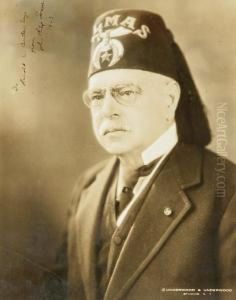John Philip. Sousa Paintings
John Philip Sousa, often referred to as 'The March King', was an American composer and conductor known primarily for American military and patriotic marches. Born on November 6, 1854, in Washington, D.C., Sousa came from a musical family of Portuguese and German ancestry. His father, Antonio Sousa, was a trombonist in the U.S. Marine Band, and his exposure to military bands influenced his later career.
Sousa showed musical talent from an early age. He began studying violin and harmony as a child, and by the age of 13, he had mastered multiple instruments. His father enlisted him in the Marine Band as an apprentice to keep him from joining a circus band. Sousa served in the U.S. Marine Band, known as 'The President's Own', for seven years before leaving to pursue further studies and a career in music.
After his apprenticeship, Sousa continued to develop his skills as a musician and conductor. He returned to the U.S. Marine Band in 1880 as its head, a position he held for 12 years. During his tenure, he elevated the status and quality of the band, making it one of the premier musical ensembles in the United States. Sousa composed many of his famous marches during this period, including 'Semper Fidelis', which became the official march of the U.S. Marine Corps, and 'The Washington Post'.
In 1892, Sousa formed his own band, 'The Sousa Band', which he conducted for the next 39 years. The band toured extensively in the United States and around the world, performing at concert halls, fairs, and expositions, and helped to popularize concert band music. Sousa's band played at the inauguration of five U.S. Presidents and made numerous recordings.
Among Sousa's most famous compositions is 'The Stars and Stripes Forever', considered his magnum opus and designated as the National March of the United States. His other well-known marches include 'The Liberty Bell', 'The Thunderer', and 'El Capitan'. Sousa's compositions are characterized by their rousing energy, crisp rhythms, and memorable melodies.
Sousa continued to lead his band on tours until his death at the age of 77. He passed away on March 6, 1932, in Reading, Pennsylvania. His legacy lives on through his music, which remains a staple in patriotic celebrations and is performed by military, school, and community bands across the United States and around the world. Sousa also contributed to the development of the sousaphone, a large brass instrument related to the tuba, which was designed to his specifications and named in his honor.
